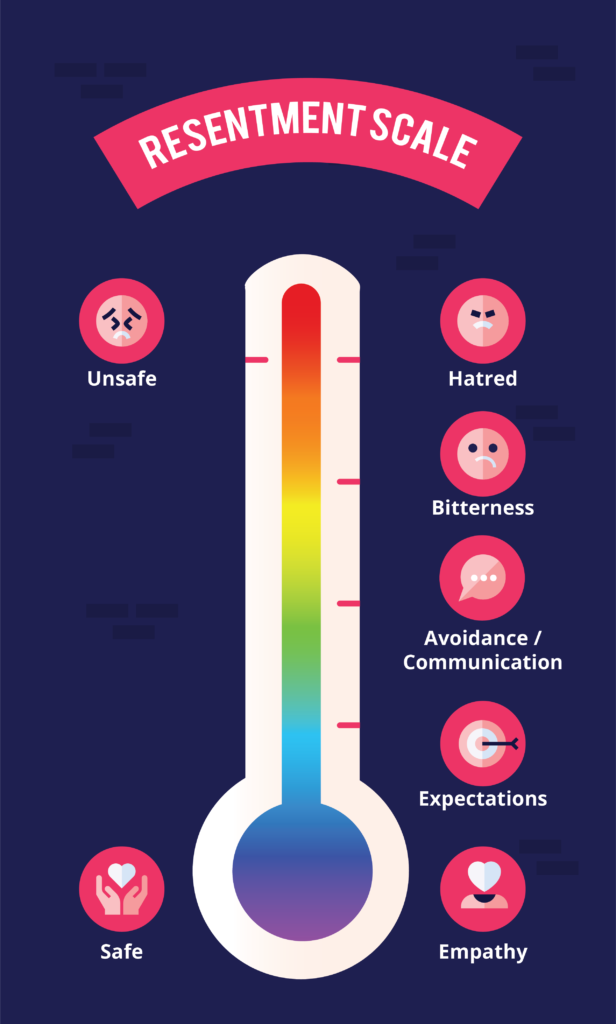Resentment is a complex, multilayered emotional reaction to being mistreated or wronged by another person, situation or series of circumstances. It is often considered a silent and deeply personal emotion, can linger beneath the surface for years, impacting mental and emotional well-being. Whether it’s tied to a past betrayal, ongoing frustrations, or unmet expectations, resentment can cloud judgment, fuel negative thoughts, and diminish one’s quality of life.
In mental health discussions, resentment is significant because of its power to corrode relationships and hinder emotional growth. However, understanding its roots and finding ways to overcome it can lead to emotional freedom and improved mental health.

Signs of Resentment
1. Constant Irritation or Frustration
Resentment often manifests as ongoing irritation or frustration toward a person or situation.
2. Passive-Aggressive Behavior
Resentment can lead to passive-aggressive behaviour that might include sarcasm, silent treatment, backhanded compliments etc.
3. Holding Grudges
Dwelling on past wrongs, even after they’ve been resolved, suggests unresolved resentment. Holding grudges makes it hard to forgive and move on, keeping resentment alive.
4. Emotional Withdrawal
Resentment can cause you to emotionally distance yourself from the person or situation that triggered it. You may feel its a way to protect yourself from further hurt.
5. Feeling Unappreciated or Taken Advantage Of
Feeling unappreciated or taken advantage of, whether in relationships or at work, can lead to resentment, especially when your efforts aren’t valued or reciprocated.
6. Frequent Complaints or Criticism
Resentful individuals tend to be overly critical or complain frequently about the person or situation that has caused their resentment.
7. Avoidance
One of the most telling signs of resentment is the urge to avoid the person or situation altogether. Whether it’s avoiding conversations, social gatherings, or interactions at work, distancing oneself is a common way to cope with these negative emotions.
8. Difficulty in Letting Go of the Past
Resentment traps people in the past, replaying negative events. Struggling to let go of old grievances or bringing up past conflicts often stems from unresolved resentment.

Resentment can get triggered by:
- Unmet Expectations
- Lack of Appreciation
- Betrayal or Broken Trust
- Unexpressed Anger
- Unresolved Conflicts
- Feeling inadequate, overlooked or unheard
- Being taken advantage of by others
- Comparisons
- Feeling Powerless
- Perceived injustice
How Resentment Affects Mental Health
- Increased Stress and Anxiety
- Relationship Strain
- Emotional Exhaustion
- Negative thought patterns
- Decline in Physical Health
- Inability to move on
It can also lead to physical problems, such as
- High blood pressure
- Muscle tension
- Headaches
- Weakened immune system
- Digestive disorders
- Sleep problems
How to deal with Resentment?
- Acknowledge Your Feelings: Recognize and accept your feelings of resentment without judgment. Understanding the emotion is the first step toward healing.
- Reflect on the Cause: Identify the root cause of your resentment. Consider the specific actions or events that trigger these feelings to gain clarity. Ask yourself, “Why am I feeling this way?”
- Communicate Openly: If appropriate, have an honest conversation with the person involved. Express your feelings calmly and respectfully to foster understanding and resolution.
- Practice Forgiveness: Work on forgiving those who have wronged you. Remember that forgiveness is more about freeing yourself than excusing their actions.
- Reframe Your Thoughts: Challenge negative thoughts related to resentment. Try to see the situation from a different perspective, focusing on personal growth and lessons learned.
- Focus on Gratitude: Shift your mindset by practicing gratitude. Regularly acknowledge the positive aspects of your life to counterbalance negative feelings.
- Engage in Self-Care: Prioritize activities that nurture your physical and emotional well-being, such as exercise, meditation, or hobbies that bring you joy.
- Channel Your Emotions: Use creative outlets, such as journal writing, art, or music, to express and process your emotions in a healthy way.
- Let Go of Perfectionism: Accept that everyone makes mistakes, including yourself. Letting go of the need for perfection can reduce feelings of resentment.
- Seek Professional Support: If resentment feels overwhelming, consider talking to a therapist or counselor who can provide tools and strategies for processing these emotions.
Resentment is indeed a powerful emotion, but it doesn’t have to dictate your mental health. By acknowledging its presence, understanding its root causes, and taking proactive steps to release it, you can regain control of your emotional well-being. As you work through resentment, you’ll find more space for compassion, personal growth, and inner peace—ultimately leading to a more fulfilling and mentally healthy life.

















Your writing is infused with empathy, compassion, and wisdom, making this article a safe haven for those seeking guidance. The way you’ve woven together relatable examples, practical advice, and gentle encouragement has created a transformative experience.